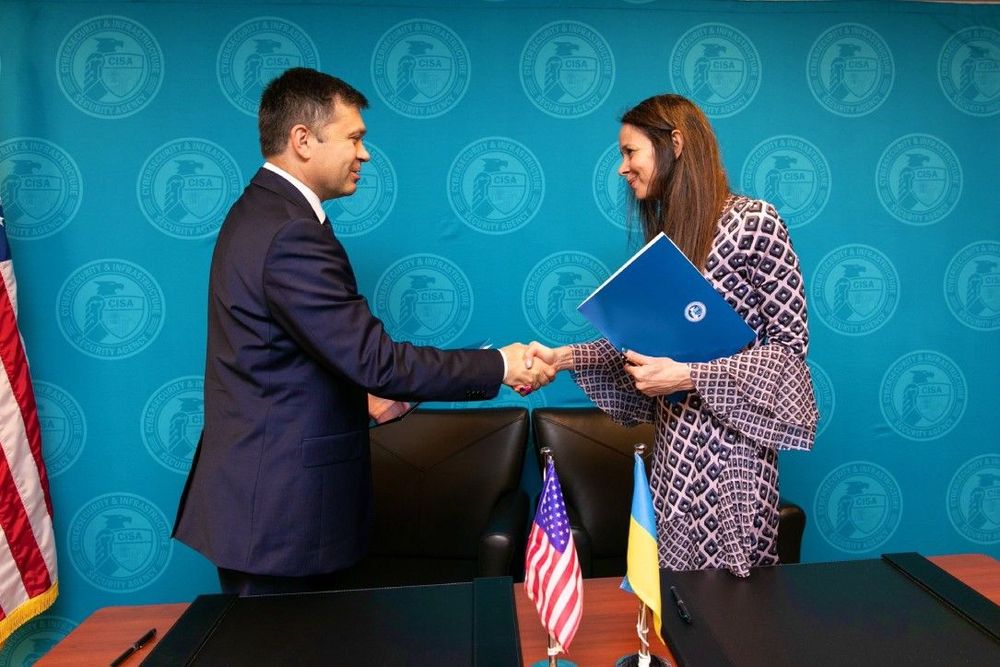CISA signs agreement with Ukraine to expand cybersecurity cooperation
The Cybersecurity and Infrastructure Security Agency (CISA) signed an agreement on Wednesday with its counterpart in Ukraine to strengthen collaboration on shared cybersecurity priorities.
СISA released the agreement following an official visit made by Ukrainian cybersecurity officials to the U.S. for a series of meetings with FBI Director Chris Wray and other top American officials.
The meetings and memorandum signal deepening ties between Ukraine and the U.S. as the two nations increasingly face cyberthreats from Russia amid its ongoing war with Ukraine.
The memorandum outlines new priorities, including sharing cyber incident response best practices and critical infrastructure security protection data, as well as conducting cybersecurity training and joint exercises.
Ukraine for years has been called “a playground” for Russian hackers, while President Joe Biden and his administration have long warned that Russians could use cyberattacks against U.S. infrastructure as a form of “retaliation” for aid to Ukraine.
“Sharing experience and joining efforts to counter cyberattacks will allow both countries to protect their information systems more effectively,” Ukraine’s State Special Communications Service (SSSCIP), which was part of the memorandum, said in a statement.
“Cyber threats cross borders and oceans,” CISA Director Jen Easterly said. The cooperation with Ukraine will help both countries “build global resilience against cyber threats,” she added.
Today, #FBI Director Christopher Wray met with Ukrainian law enforcement and cybersecurity leaders in New York to discuss Russia's ongoing #cyber campaign against Ukraine and opportunities for teamwork in countering Russian nation-state cyber actors and cybercriminal groups. pic.twitter.com/JyC1SlESX0
— FBI (@FBI) July 19, 2022
Ukrainian cybersecurity officials visited the U.S. this month at the invitation of the FBI, and one of its top security officials, Victor Zhora, told CyberScoop that Ukrainians are particularly interested in learning how to improve coordination between government agencies to better confront cyberattacks.
In Ukraine, six government agencies are responsible for information security: the State Security Service, for example, fights against cyberterrorism; the Cyberpolice protects against cybercrime and violation of personal data laws; and the National Security and Defense Council helps them coordinate.
Another priority for Ukraine is joint training. For many years, Ukrainian state cybersecurity agencies were underfinanced and couldn’t recruit talented specialists. When the war began, thousands of Ukrainian hacktivists organized their efforts and launched the IT Army that countered Russian cyberattacks without the support of government agencies.
The new agreement with CISA “is an important step for the integration of Ukrainian cyber defenders into the global professional cyber environment,” according to SSSCIP.
During the war, Ukraine and the U.S. have already participated in joint cyber exercises. In April, for example, they took part in the Locked Shields competition — an international real-time cyberdefense exercise organized by NATO.
Although Ukraine is not a NATO member, it was accepted this year into NATO's cyber defense center, based in Tallinn. During the Locked Shields exercise, some Ukrainians teamed up with Americans, according to competition organizers.
“Being a testing ground for the use of cyber-tools for malicious purposes, Ukraine has the unique practical experience in neutralizing cyberattacks that may be useful to partner countries,” Ukrainian ambassador to Estonia Mariana Betsa said at the time.
Other countries seem willing to learn. On Thursday, Ukraine also signed a cybersecurity memorandum with Slovenia. Its goal is to exchange policy-making, legislative, judicial, educational and scientific practices related to cybersecurity.
Daryna Antoniuk
is a reporter for Recorded Future News based in Ukraine. She writes about cybersecurity startups, cyberattacks in Eastern Europe and the state of the cyberwar between Ukraine and Russia. She previously was a tech reporter for Forbes Ukraine. Her work has also been published at Sifted, The Kyiv Independent and The Kyiv Post.



